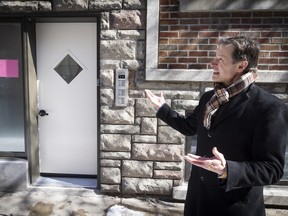Montreal was one of the few municipalities in Quebec charging a special tax to shelters and transitional housing. The city’s 2025 budget ends the practice.

The City of Montreal is eliminating the special “compensation” tax it charges non-profit building owners on their homeless shelters and transitional housing starting next year.
The announcement, which will cost the city about $10.5 million per year, was made in Montreal’s 2025 municipal operating budget that was presented on Wednesday. It was immediately welcomed by charitable organizations that provide shelter and services to unhoused people.
“We’re very pleased and very grateful that the city has gone forward and done what many other cities have done,” James Hughes, president and CEO of Old Brewery Mission, said upon learning of the cancelation of the special tax. Old Brewery Mission paid about $125,000 in “compensation” tax to the city this year alone.
“We can now breathe a little easier on the financial front.”
In fact, Montreal’s “compensation” tax rate of 50 cents per $100 of municipal property valuation was even higher than the general property rate charged to homeowners across Montreal Island in 2024.
Organizations like Old Brewery Mission and Welcome Hall Mission told The Gazette earlier this year that they thought they were getting a discount on their property taxes because of their tax-exempt status and weren’t aware that many other municipalities in Quebec don’t levy a “compensation” tax at all and that they were being charged a higher rate than the general property tax rate in Montreal.
Montreal has been charging 50 cents per $100 of valuation to tax-exempt non-profits for decades. However, the general property tax rate was over $2 per $100 of valuation years ago. But it was $0.4977 per $100 of valuation in 2024 — the city lowered the general tax rate as property values exploded during the 2000s.
Quebec’s Act Respecting Municipal Taxation allows municipalities, if they choose, to charge tax-exempt building owners a “compensation” to make up for not paying property taxes that help pay for garbage collection and other municipal services.
In contrast to Montreal, cities like Laval and Longueuil charge nothing to non-profits that own buildings serving as shelters and transitional lodging and that have been granted a municipal tax exemption from the CMQ.
The CMQ is the provincial body that determines whether a building qualifies for tax exemption under Quebec’s Act Respecting Municipal Taxation. The law has narrow criteria regarding exemptions. For example, buildings owned by non-profits with transitional — meaning temporary — housing qualify. But permanent non-profit housing, even for low-income Quebecers, doesn’t qualify.

“It helps us because it’s money we don’t have to raise,” Watts said.
“What it doesn’t do is address all of the taxes that have been paid for a number of years. So this is something that is good going forward, but I think we have to recognize that for a number of years now, the city has been asking organizations like Welcome Hall Mission to pay taxes and at the same time deliver services to the vulnerable. The cost of those taxes was largely borne by donors.”
Should the city reimburse non-profits? “In an ideal world, I would say yes,” Watts said. Welcome Hall Mission paid $145,000 in “compensation” taxes to the city on its seven buildings this year alone.
As well, the city’s move doesn’t eliminate all forms of municipal taxation. Organizations working with homeless people still pay the mutations tax — also known as the Welcome Tax — when they purchase properties to create transitional housing.
For example, Welcome Hall Mission bought a building on Ontario St. E. this summer and paid a Welcome Tax bill of $140,000.
“When we’re buying a building to deliver services to the vulnerable, and the city is supporting that plan … it strikes me as strange that at the same time they’re saying ‘we’ll take your cheque for $140,000,’ which I can guarantee you has been cashed,” Watts said.
“It puts an extra burden on us when it comes to funding and making operational something that is designed to serve the public good.”